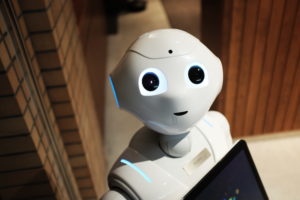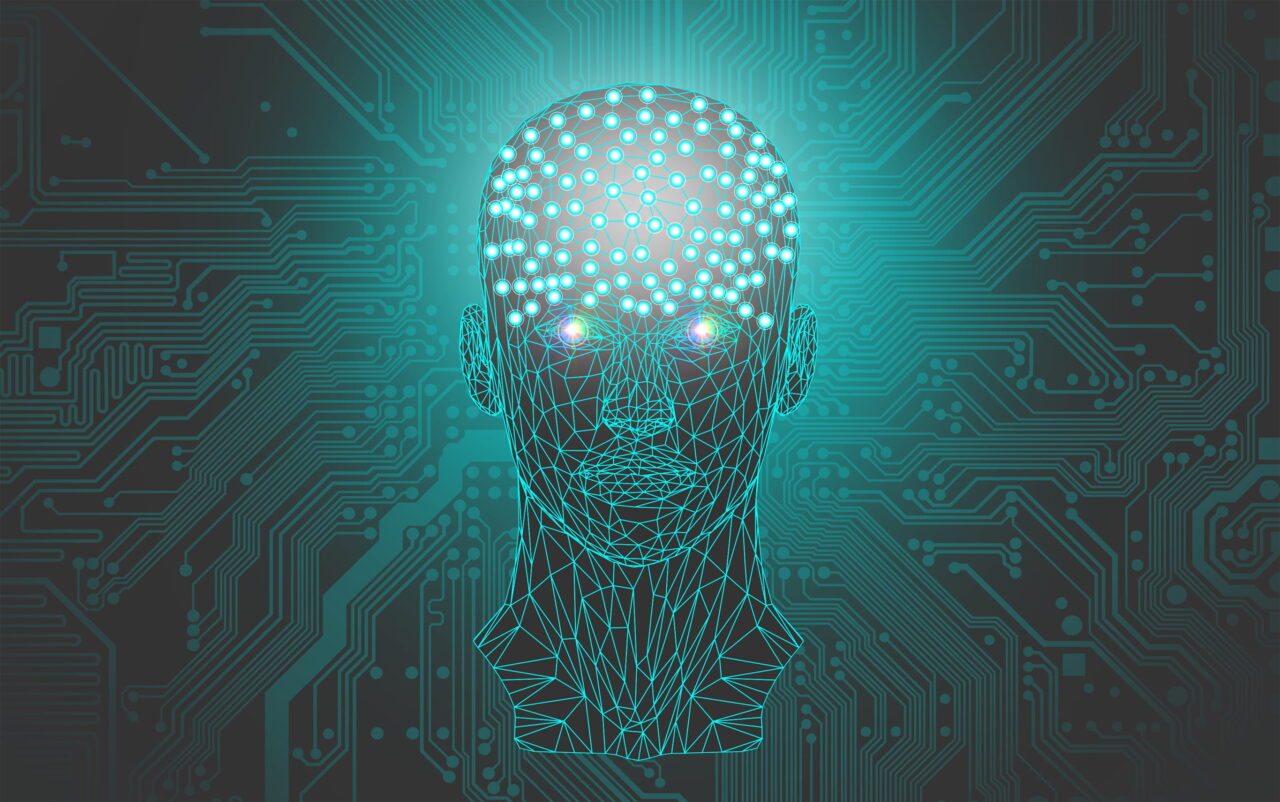
This is actually Pepper, not Teacherbot
What is Teacherbot?
Teacherbot is an artificial intelligence project to automate some aspects of teaching, thereby improving efficiency and allowing for the more ‘teacher-light’ tuition required for providing courses on the scale of MOOCs.
I had been interested in hearing more about Teacherbot ever since I first heard of it at the IT Futures conference in December, so it was a very nice surprise to see it featuring in the online education course.
Teacherbot was created to engage with students of Edinburgh University’s e-learning and digital cultures MOOC on Twitter. Teacherbot replied to tweets containing the #edcmooc hashtag, with responses drawing on keywords and how they were linked through terms such as “and” or “not”. It engaged with hundreds of students, tweeting about 1,500 times over the duration of the course.
Teacherbot could answer simple questions, and could respond to more complex questions by posting key quotes or asking ‘Would anyone else like to connect?’ Students felt it helped them engage with the idea of automated teaching, and said that Teacherbot had prompted them to think.
Is Teacherbot a Threat to Teachers?
Personally I would not like the implication that my job could be automated, although I’m sure a lot of it could. And according to the Teacherbot article, some teachers are way ahead of me on this, describing the context of online education as one of embrace from ‘corporate strategists. … top university administrators, and “futurologists”’, motivated by the automation of teaching as a means for achieving greater efficiency in the ‘business’ of education:
“Their goal is to replace (at least for the masses) face-to-face teaching by professional faculty with an industrial product, infinitely reproducible at decreasing unit cost.”
Feenberg (2003)
It’s a fair point, I would think, as that does seem to be the goal of automation in teaching (as in most things).
However, according to Professor Bayne, rather than competing with human teachers, Teacherbot demonstrated how teachers and students could use technology in a way that was pedagogically productive while still being based on simple programming.
It puts automated teaching back in the hands of teachers.
Philosophical Issues
Fairly early on, I had to stop to look up a definition for Critical Posthumanism, something that will now be tagged in as many of my blog posts as possible. I turned to Google, and found a very interesting definition that it will take me a few careful readings to understand:
“Critical posthumanism is a theoretical approach which maps and engages with the “ongoing deconstruction of humanism”.[1] It differentiates between the figure of the ‘posthuman’ (and its present, past and projected avatars, like cyborgs, monsters, zombies, ghosts, angels etc.) and ‘posthumanism’ as the social discourse (in the Foucauldian sense) which negotiates the pressing question of what it means to be human under the conditions of globalisation, technoscience, late capitalism and climate change (often, very problematically, by deliberately blurring the distinctions between science fiction and science fact.”
Posthuman Glossary, via Genealogy of the Posthuman
Being already familiar with cyborgs, monsters, zombies, ghosts and angels, my next step was to look up ‘Foucauldian’, which turned out to be interesting too:
“Foucauldian discourse analysis is a form of discourse analysis, focusing on power relationships in society as expressed through language and practices, and based on the theories of Michel Foucault.”
Wikipedia: Foucauldian discourse analysis
and:
“What is Foucault theory of power?
According to Foucault’s understanding of power, power is based on knowledge and makes use of knowledge; on the other hand, power reproduces knowledge by shaping it in accordance with its anonymous intentions. Power (re-) creates its own fields of exercise through knowledge.”
I think it could take me a long time to read this. On the bright side, critical posthumanism sounds like just my kind of thing. Foucauldian discourse analysis, maybe not so much, but ok. Moving on…
The humanisms of digital education
I liked this quotation:
Where does this leave the human teacher? Well let me quote this dictum. Any teacher that can be replaced by a machine should be! (Clarke 1980, 96)
Usher and Edwards (Usher and Edwards 1994) perhaps best summarise the humanistic foundations of educational practice:
“The very rationale of the educational process and the role of the educator is founded on the humanist idea of a certain kind of subject who has the inherent potential to become self-motivated and self-directing, a rational subject capable of exercising individual agency. The task of education has therefore been understood as one of ‘bringing out’, of helping to realise this potential, so that subjects become fully autonomous and capable of exercising their individual and intentional agency.”
Ok. It sounds as if they want to encourage students to become self directed learners. But I don’t understand why the issue of “compulsory humanity” (McKay 2005) even exists. Why would a student not be human, or have I missed a point?
Moving on…
“Edwards (2010) suggests that posthumanism inclines us to think towards education as an assemblage of the human and non-human, an ‘entanglement’ in which the purpose of education becomes not one of ‘learning’ but one of a creative ‘gathering’, in which the human subject cannot be seen as separate from the objects of knowledge with which it is concerned.”
According to this argument, the post-human condition cannot be one of learning, since the subject doing the learning and the object being learned are no longer readily distinguishable from each other.
I am so unconvinced by this. And this:
” ‘Recent posthumanist scholarship reveals that the human is not simply a being that is, but a social construction formed and defined in relation to various non-human Others’ “
Snaza, 2013
Are they actually trying to get round teachers not wanting to be replaceable by technology with some kind of philosophical argument about what it is to be human?
I don’t know, I just think this is all unnecessary. Surely Teacherbot can be a useful program, (or not), or as they describe it, a human/non-human teaching assemblage, without taking some kind of philosophical stand?
Do we really need to resist anthropocentrism in education? Does the increasing use of digital education mean education is becoming posthumanist?
I’m not surprised by any of this:
” It is however rare to find engagement with these ideas in the literatures on teaching with technology, which tend rather to be focused on anthropocentric resistances to the technological ‘working-over’ of teaching, or on equally humanistically oriented promises of, and imperatives for, ‘enhancement’ via technological progress within the work of academy. ‘Teacher automation’ emerges within this literature almost as a nexus between the positions of technological-promise and technological-threat. “
I am starting to lose patience with this kind of thing:
” I will briefly survey this landscape of resistance and embrace, before moving on to consider a particular intervention – the ‘teacherbot’ – designed as a posthumanist ‘gathering’ allowing us to play across the torn landscape of pedagogic automation.”
I’m interested in Teacherbot. I’m interested in what it does, how it works and what it’s for.
I suppose it’s not surprising that an academic journal article wouldn’t be prioritising what I wanted to find out about this, but it’s been interesting!
Links
- Teacherbot: interventions in automated teaching – Sian Bayne
- Critical Posthumanism – Genealogy of the Posthuman
- Posthuman Glossary
- Wikipedia: Foucauldian discourse analysis
- Wikipedia: Power-knowledge
- McKay, R. 2005. “‘Identifying with the Animals’: Language, Subjectivity and the Animal Politics of Margaret Atwood’s Surfacing.” In Figuring Animals: Essays on Animal Images in Art, Literature, Philosophy and Popular Culture, edited by M. S. Pollock and C. Rainwater, 207–227. New York: Palgrave Macmillan. [Google Scholar]

This is really just an excuse for another robot picture



Leave a Reply